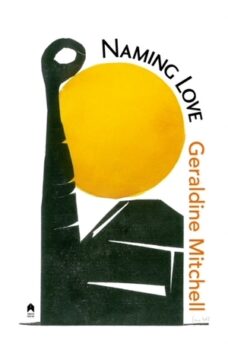by Dick Edelstein

Irish poet Geraldine Mitchell begins her new collection as she means to go on, choosing as an epigraph an untitled, haiku-like poem in an exalted tone:
a blackbird knaps
the flint of my heart,
sparks fly
Written in a non-classical style, the epigraph is a signpost indicating the celebratory mood prevailing in this collection, her fifth in 15 years. The mini-poem is the first of several graceful haiku-like forms sprinkled throughout the volume like pixie dust. Formally diverse, mostly without titles, standing alone on a page, they resemble marginalia. Like a Greek chorus, they make meta-commentaries on the text as well as statements and observations.
seabirds
face into the wind
waves explode
like outraged snow
trees are open
cages where birds
in safety
sing their limits
Seeking new challenges, Mitchell experiments with form without becoming wedded to a formula, so each collection is a revelation. The haiku-like poem below has a title, a more formal syntax, and a discursive tone, and it manifests an element of surprise, giving readers a chance to consider how much the feeling of haiku is associated with a particular syllabic arrangement, as opposed to line breaks or thematic content.
FOLLY
I have fallen in love
with a tree.
At my age.
Imagine.
This collection is permeated by the notion of age, of longevity and mortality, something inquieting and hard to ignore. The first two poems assault the reader’s sensibility, and a Proustian motif emerges from the first: “the past is too much when the present is thinning and the future grows shorter by the day”. In the mid-section of this prose poem, Mitchell shares the following observation:
Oh, the past is a sack
stuffed with worn-out emotions that shouldn’t weigh
anything, no more than a handful of feathers,
comforting, soft, a pleasure to sift through, but you’re
back on the ground with a jolt and your feet sink into
the snow with the weight of the bag on your back
and you look around for somewhere to dump it, but the
scrapyards are closed for the season (…)
It took me a good while to burrow into this volume, contemplating what I had experienced, sometimes feeling unready to move on after reading a particular poem, pausing to chew on each mouthful before biting off the next. Since many of the poems instil contemplation, to read them in a perfunctory way would be nonchalance or evasion.
Mitchell constantly incorporates new formal variations that relate to the text as a whole, influencing how readers apprehend it; and these innovations invariably have their roots in her earlier writing. In this case, periods in the text have been omitted. Nothing is casual about Mitchell’s use of stylistic devices: the formal styling creates a specific effect, as in the sonnet-inspired poem “Need to Know”, whose playful formal scheme contrasts with an ominous content.
where did you go in the night was it
dark was it cold where you were out
there on the sea in the night was there
wind did it rain what did you see in
the night on the sea in the rain did you
meet your mother did you see yourself (…)
The emotional tone of some of Mitchell’s recent verse tells readers that her involvement with events she observes is more than an aesthetic response: existential questions sometimes hang in the balance; echoes of experience can overflow like a river, as in the poem “In Spate”:
This river will not see you light a candle on the bridge,
the flowers you throw will waltz a moment, disappear.
Rivers know no gods. Appease them now.
“Home Movie”, the second poem in this volume, makes an impression with its plaintive, colloquial tone—beginning in mid-conversation—and with a breezy conversational style like a speaker talking to themself. The tone turns blithe as the monologue chirpily marches off in one direction while the subject matter shifts from colours and images to sadness, darkness, and death. In the following stanzas, the wind-battered ship of the narrative eventually rights itself to rest on an even keel. Whew! Disaster averted. Readers looking to just dip into a poem to be washed over by the language need to choose another; this poem gives no quarter:
What I liked most were the colours
of the film I played in my head
that long year of sadness and darkness
and death. (…)
While the natural world supplies most of the objects of wonder that appear in this collection, the verse prompts us to contemplate existential situations since the discourse encompasses musings on our place in the world and misgivings about the current state, a convincing demonstration that the work of poets is not to entertain an audience until more important voices take the stage to explain how things really are; Mitchell’s verse manifests poetry as a form of discourse as valid as any, that can withstand examination as much as rants of politicians, analyses of self-defined experts or the logorrhoea of rappers.
Even in a commercialized world, opportunities to have a genuine experience abound, usually hiding in plain sight. Mitchell and other Irish poets routinely perform in small venues, where it matters little whether the place is packed or half-full. By contrast, many people recently flew into Barcelona to hear Ricky Gervais—in person, not on the idiot box—explain to his enthusiastic fans why he believes that words can’t hurt people. Oscar Wilde’s observation about confusing the price of a thing with its value is not only still valid; it is an urgent warning addressed to the future.
There is a lot of naming in this volume and much of it has to do with the natural world, but the act of putting names to things has further implications: thinking of Linnaeus, the action of naming is a first step in the accumulation of knowledge of the material world, and this notion resonates with much of Mitchell’s more recent verse.
Before the web, poets transferred knowledge, using their mastery of words to disseminate experience in an amenable way. These days, you might spot Geraldine Mitchell and other County Mayo writers on a stealth visit to Dublin or Barcelona, but chances of hearing them read are much better in Castlebar, Louisburg or Strokestown, in remote parts of the West of Ireland. For the price of a pint, the audience at a poetry reading are not just entertained; they engage with others on topics of import to them, an activity permitted in some parts of our society, but in others, not so much. Community gatherings pre-date the internet, radio, the telegraph, and the printing press, so if poets have played key roles in social functioning and still do today, why do some people say they should get a real job?
The American poet Gary Snyder dropped a trail of crumbs in 1974, when he published the poem “The real work” in Turtle Island, a Pulitzer Prize-winning collection of poetry and essays, obliquely suggesting that the “real work” of humanity is not furthering agendas promoted by corporate interests or any ruling elite; and for decades many readers have heeded his message.
Mitchell’s published collections result partly from insights gleaned over a lifetime of covert observation and reflection. By her own admission, she spied on adults from an early age, covertly listening to their conversation with the ear of a radical sceptic, contrasting what she heard with her own experience in order to judge its truth value.
Since the word truth covers a multitude of sins, I note in passing that the poet’s truth, more like a Swiss Army knife than a surgical instrument, is nonetheless a useful one. This truth is in our DNA, and we know it when we see it. Does someone hug you while trying to keep their body in the other side of the room? Does a politician’s face send a message that contradicts his or her discourse?
Mitchell finds lessons for life in natural settings populated by trees, wildlife, the sea, and the moon; and while some people may consider this sort of thinking indulgent and specious, I give my enthusiastic assent to the notions about our place in the natural world expressed by Geraldine Mitchell, Gary Snyder, Wendell Berry, the young American poet Ricky Ray—and by other poets and writers.

So many Irish poets—of long experience and relative beginners—are writing useful verse that it would be an injustice to single out just a few, and I believe that if there are any truths to be bagged—even partial or contingent ones—we are more likely to find them in the flutter of a leaf or the caw of a bird than in the farrago of entangled symbol systems that are modern language and thought. So, I admire the work—the real work—of these poets and writers who work to achieve clarity in language, even as chaos reigns, and, among them, Geraldine Mitchell, silent observer and radical sceptic.
***
Naming Love by Geraldine Mitchell, 80pp, Arlen House, 2024, ISBN 978-1-85132-319-7. International distribution: Syracuse University Press. Available through blackwells.co.uk and kennys.ie.
